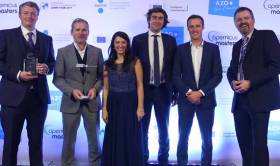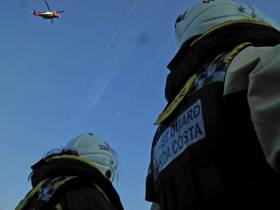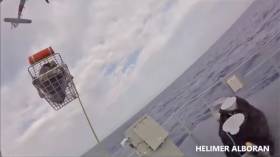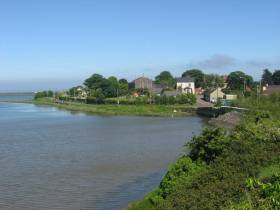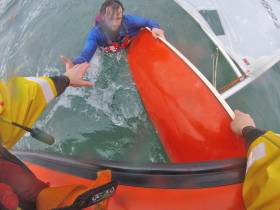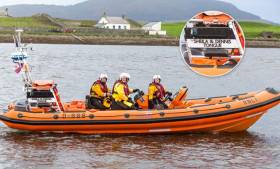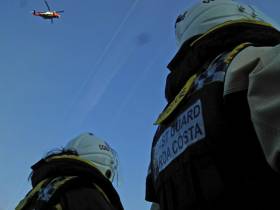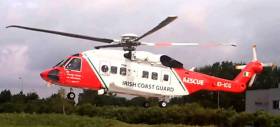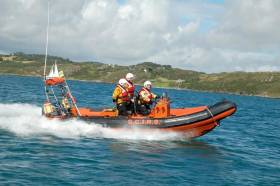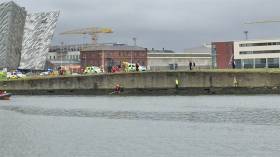Displaying items by tag: Rescue
Irish Startup Scoops European Commission Prize at European Satellite Navigation Competition 2017
Donegal based startup, DroneSAR Ltd has won the European Commission prize announced last night (7 November 2017) in Tallinn, Estonia at the awards ceremony for the 14th European Satellite Navigation Competition (ESNC) winners. DroneSAR Ltd were awarded this prize for the development of software which transforms standard “off-the-shelf” drone and mobile device pairings into enhanced search and rescue (SAR) data transmission technology that will save lives.
The European Commission Prize - the Copernicus Masters Services Challenge - is one of a range of challenges and prizes on offer to the 321 finalists in the ESNC competition. It is awarded for innovative uses of the European Commission operated Copernicus program products. The Copernicus program is a European Union Programme aimed at developing European information services based on satellite Earth Observation data and implemented in partnership with Member States, the European Space Agency (ESA) and a number of other European organisations.
DroneSAR Ltd were presented with a cheque from the European Commission, which is in addition to their award as Ireland Region Winner. The Ireland Region Competition for the annual ESNC awards has been organised and sponsored by National Space Centre Ltd since 2012.
DroneSAR Ltd is the brainchild of it’s four co-founders who each possess expertise and skill-sets specific to the world of drone technology, network and satellite communication and SAR coordination and emergency response.
CEO Oisin McGrath said “DroneSAR makes it possible to use affordable, “off-the-shelf” drone technology to expedite successful outcomes during emergency response incidents. It delivers the right data to the right people at the right time when agencies are faced with time and resource constraints. We are delighted to have won this award from the European Commission.
Each member of the DroneSAR team has contributed to realise a software product that will play a major part in ensuring that emergency response time-frames, incident coordination, decisions and successful outcomes will be realised across all sectors of the emergency response and humanitarian relief environment.”
To deliver the service, DroneSAR Ltd has partnered with leading outdoor pursuit software providers Viewranger, global maritime distress software company SafeTRX and medical distress location software, Medimee, all of which will allow victim position data to be sent to DroneSAR software for automatic flight to the location.
Rory Fitzpatrick, CEO National Space Centre said “This is worthy recognition for an outstanding product that has both commercial and lifesaving potential. We are incredibly proud to see this young Irish company perform so strongly on the international stage.”
National Space Centre Ltd is based at Elfordstown Earthstation, Midleton and delivers uplink and downlink services to domestic and international teleport and satellite communications markets.
Fall From Helicopter Winch ‘Unlikely’ To Have Led To Death In Hook Head Rescue Tragedy
#Coastguard - The Irish Coast Guard crew winching two teenagers from the sea when one fell from her harness had never lifted two casualties at the same time before, as BreakingNews.ie reports.
Aoife Winterlich, 14, was one of four teenagers who had been swept into the sea off Hook Head during an outing for venture scouts on 6 December 2015.
Two managed to swim ashore but Winterlich got into difficulty in heavy seas. The fourth, a 15-year-old boy, attempted to keep her afloat until rescue arrived minutes later.
It was when Rescue 117’s crew attempted to transfer the pair into the helicopter that Winterlich slipped from her strop some 45 feet back into the water.
Records show that the winchman was back in the water to retrieve Winterlich within moments, and that she was in the helicopter just over a minute after.
The inquest into Winterlich’s death this week heard that she died from lack of oxygen to the brain resulting from near drowning, and that there was no evidence of contributing physical trauma.
Prof Maureen O’Sullivan of Our Lady’s Children’s Hospital in Crumlin, who conducted the post-mortem, said the fall was unlikely to have contributed to Winterlich’s death, according to RTÉ News.
The inquest also heard that the coastguard helicopter’s winchman and winch operator had never performed a lift of more than one casualty in a single lift.
Winch operator Neville Murphy told Dublin Coroner’s Court the situation that led his college Sean Jennings to descend with two winch strops was “unprecedented”.
“Two people in the water, that generally doesn’t happen,” he said. “We can only train to certain limits. We can never know what we are faced with as we look out the door of the aircraft.”
Earlier this year, the Air Accident Investigation Unit report into the incident concluded there was “nothing to suggest that the winchman’s decision-making was anything other than sound”.
The inquest is adjourned till October. BreakingNews.ie has more on the story HERE.
#Navy - A Naval Service seaman has expressed his gratitude to the Spanish coastguard for saving his life, after he fell ill while on humanitarian duty in the Mediterranean.
According to the Irish Examiner, Craig Clear was airlifted to Almeira from the deck of the LÉ William Butler Yeats on Tuesday (18 July) after suffering a collapsed lung and severed arteries.
But after two successful surgeries, the Co Laois man is in recovery — and on Wednesday he took to social media to share his gratitude to the helicopter rescue team from the Salvamento Maritimo.
The LÉ William Butler Yeats arrived in the Mediterranean on Monday (17 July) to take over from the returning LÉ Eithne, which is due in Cork Harbour today, as previously reported on Afloat.ie.
Boyne Boat Capsize Trio ‘Lucky To Be Alive’
#Coastguard - Three people are “extremely lucky to be alive” after their boat upturned on the River Boyne last night (Monday 17 April), as TheJournal.ie reports.
The three casualties rescued east of Mornington, Co Meath were found to be not wearing lifejackets when they were rescued by volunteers from Drogheda Coast Guard.
Clogherhead RNLI also attended the incident, which occurred east of Drogheda Port, after a member of the public raised the alarm around 9.30pm.
“Only for the quick thinking of the caller and the rapid response from all agencies involved were we able to bring this incident to a successful conclusion,” said an Irish Coast Guard statement.
Elsewhere, DublinLive reports on Howth Coast Guard’s rescue of two kayakers stranded at Ireland’s Eye on Saturday afternoon (15 April).
The coastguard volunteers were on exercise when by chance they happened upon the kayaking duo, who had set out with no means to call for help.
Bangor Lifeboat Rescues Man From Capsized Dinghy
#RNLI - Following yesterday’s hoax calls, Bangor RNLI’s lifeboat volunteers rescued a man clinging to a capsized dinghy in Ballyholme Bay this afternoon (Monday 3 April).
The casualty, a 26-year old man, had quickly got into difficulty and capsized after launching from the Belfast Lough beach in a strong offshore wind gusting up to 30 knots.
This was seen by a member of the public who called 999, and CGOC Belfast Coastguard requested Bangor RNLI to respond.
Arriving on scene within minutes, the crew were delighted to see that the man had stayed with his boat and not tried to make it to shore. They were also happy to report that he was wearing appropriate safety gear: a wetsuit with a buoyancy aid.
After taking the casualty on board and assessing that he was uninjured, they returned him and his boat to the beach where the coastguard were waiting to assist.
Bangor lifeboat helm James Gillespie said: “This man clearly made the wrong decision to attempt to sail in a new boat in such conditions, but by wearing appropriate wet weather gear and staying with his boat he made our rescue much easier.
“The body tires quickly is cold water and he made the right decision to stay with his boat, knowing that his plight had been seen from the shore.”
Bangor RNLI’s deputy launching authority, Bryan Lawther added: “We are delighted to have been to help this man and bring him to safety. He has been advised to further his sailing knowledge with the assistance of a yacht club where rescue services are always on hand for learners.
“After yesterday’s hoax calls, this rescue highlights the importance of our service and our willingness to attend any genuine call.”
Divers Rescued Off Sligo In Heavy Seas
#Rescue - The Irish Times reports on the rescue of eight divers off the Sligo coast after a boat capsized this morning (Sunday 19 March).
Sligo Bay RNLI were tasked to the scene off Aughris Pier in Sligo town after the incident during a diving excursion, rescuing seven from a heavy swell.
An eighth person was subsequently recovered from the water and airlifted to Sligo Hospital by the Irish Coast Guard helicopter Rescue 118, which was diverted from the ongoing search for the missing crew of Rescue 116.
Independent.ie reports that the latter diver was in serious condition, and that a second diver was later hospitalised.
#Coastguard - The actions of a helicopter winchman during an incident in which a 14-year-old girl rescued from the sea fell back into the water have been found to be “sound” by an official investigation.
Aoife Winterlich died in hospital days after she and three other venture scouts were swept into the sea off Hook Head during an outing on 6 December 2015, as previously reported on Afloat.ie.
Two managed to swim to shore but Winterlich got in difficulty amid heavy seas, and the fourth youth, a 15-year-old boy, remained to keep her afloat till the Waterford-based Irish Coast Guard helicopter Rescue 117 arrived.
Severe conditions prompted the winchman to lift both teenagers from the water at the same time. As the three reached the helicopter, Winterlich slipped from her strop some 45 feet back into the water.
Records show that the winchman was back in the water to retrieve Winterlich just half a minute after reporting her fall, according to the Air Accident Investigation Unit Report as covered in The Irish Times.
Tragically, however, she died four days later at Our Lady’s Children’s Hospital in Crumlin.
“In the circumstances of this particular rescue, there is nothing to suggest that the winchman’s decision-making was anything other than sound,” the report said.
The Irish Times has more on the story HERE.
Sligo Coastguard In Medevac Of Russian Fisherman Off Mayo
#Rescue - The Sligo-based Irish Coast Guard helicopter completed an early-morning medevac of a crewman from a Russian fishing vessel off the Mayo coast yesterday (Wednesday 8 March).
Owing to the distance involved in the rescue effort, communication support — known as ‘top cover’ — was provided for Rescue 118 by a second coastguard helicopter, the Dublin-based Rescue 116.
Both helicopters refuelled at Blacksod prior to transiting to the scene, some 180 miles north west of Erris Head.
The Russian crewman, who required urgent medical attention, was airlifted at 4.30am and transferred to Sligo University Hospital, where he was admitted shortly before 6am.
The operation was co-ordinated by the Marine Rescue Sub Centre in Malin Head.
Schull’s Community Lifeboat To Join Irish Coast Guard
#Rescue - Schull’s independent community lifeboat will soon join the Irish Coast Guard, as the Southern Star reports.
Established in 2005, the Schull Community Inshore Rescue Service will be officially renamed as Schull Coast Guard later this month after two years of talks on assimilating the West Cork volunteer rescue service with the national SAR agency.
A reception is planned to mark the change, details of which will be announced on the SCIRS Facebook page.
The Southern Star has more on the story HERE.
Woman Rescued After Laganside Fall In Belfast Harbour
#Rescue - A multi-agency response was launched after a woman fell from a quay in Belfast Harbour onto the banks of the River Lagan on Saturday (25 February).
According to the Belfast Telegraph, the woman sustained injuries to her head and limbs after apparently slipping from the quayside onto the rocky riverbank.
Her calls for help were heard across the harbour at the offices of Sunday Life by a reporter, who raised the alarm around noon.
Teams from Lagan Search and Rescue, the NI Fire Service, PSNI and ambulance crews joined the coastguard boat that recovered the woman from the scene in Victoria Channel.



























